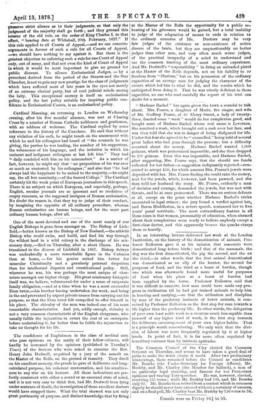The confidence of Englishmen in the class of medical men
who pass opinions on the sanity of their fellow-citizens, will hardly be increased by the opinions (published in Tuesday's Times) of the doctors who were asked to examine the Rev. Henry John Dodwell, acquitted by a jury of the assault on the Master of the Rolls, on the ground of insanity. They dwell on his excellent memory, the proofs he gave of deliberate and long- calculated purpose, his coherent conversation, and his sensitive- ness to any slur on his honour. All these indications are per- fectly consistent with either a sound or an unsound state of mind, and it is not very easy to think that, had Mr. Dodwell been lying under sentence of death, the investigation of these excellent doctors would have stopped there. What the trial showed was not only great pertinacity of purpose, and distinct knowledge that by firing at the Master of the Rolls the opportunity for a public re- hearing of his grievance would be gained, but a total inability to judge of the adaptation of means to ends in relation to the ordinary concerns of life. Doctors may be very fair judges of the existence or non-existence of active disease of the brain, but they are unquestionably no better judges than other men, and very often much worse judges, of the practical incapacity of a mind to understand and use the common teaching of the most ordinary experience. And Mr. Dodwell's " responsibility " in firing an unloaded pistol at the Master of the Rolls depends, not on his liability to or freedom from "illusions," but on his possession of the ordinary capacities of an average man for judging the character of the events which led him to what lie did, and the results which he anticipated from doing it. That he was utterly deficient in these capacities, no one who read carefully the report of his trial can doubt for a moment.


































 Previous page
Previous page